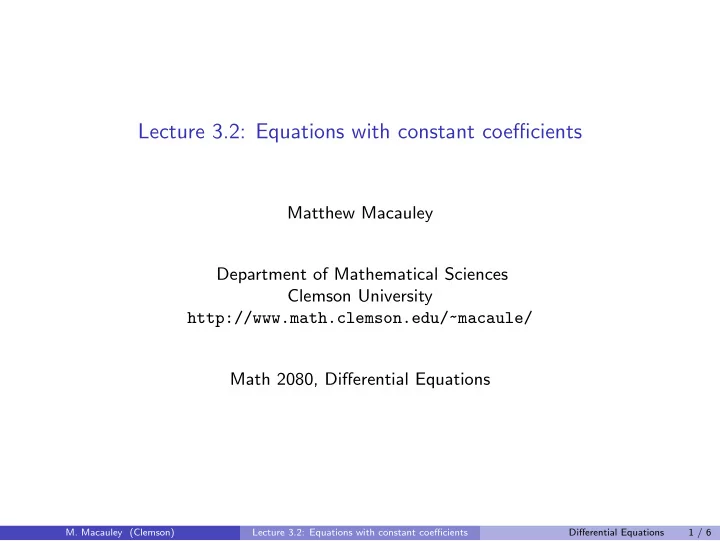

Lecture 3.2: Equations with constant coefficients Matthew Macauley Department of Mathematical Sciences Clemson University http://www.math.clemson.edu/~macaule/ Math 2080, Differential Equations M. Macauley (Clemson) Lecture 3.2: Equations with constant coefficients Differential Equations 1 / 6
Introduction Recall A linear 2nd order ODE has the form y ′′ + p ( t ) y ′ + q ( t ) y = f ( t ), and it is homogeneous if f ( t ) = 0. Approach We will always solve the related “homogeneous equation” first. In this lecture, we will consider homogeneous ODEs for which p ( t ) and q ( t ) are constants. The general solution will be y ( t ) = C 1 y 1 ( t ) + C 2 y 2 ( t ) . Goal : Find any y 1 ( t ) and y 2 ( t ) that solve the ODE. Example 1 Find the general solution to y ′′ = k 2 y . Example 2 Find the general solution to y ′′ = − k 2 y . M. Macauley (Clemson) Lecture 3.2: Equations with constant coefficients Differential Equations 2 / 6
More examples Example 3 Find the general solution to y ′′ − 3 y ′ + 2 y = 0. M. Macauley (Clemson) Lecture 3.2: Equations with constant coefficients Differential Equations 3 / 6
A problem case Example 4 Find the general solution to y ′′ − 6 y ′ + 9 y = 0. M. Macauley (Clemson) Lecture 3.2: Equations with constant coefficients Differential Equations 4 / 6
Another problem case Example 5 Suppose we want to solve y ′′ + py ′ + qy = 0, and the roots of the characteristic equation are complex numbers r 1 , 2 = a ± bi , with b � = 0. M. Macauley (Clemson) Lecture 3.2: Equations with constant coefficients Differential Equations 5 / 6
A review of complex numbers and Euler’s formula M. Macauley (Clemson) Lecture 3.2: Equations with constant coefficients Differential Equations 6 / 6
Recommend
More recommend